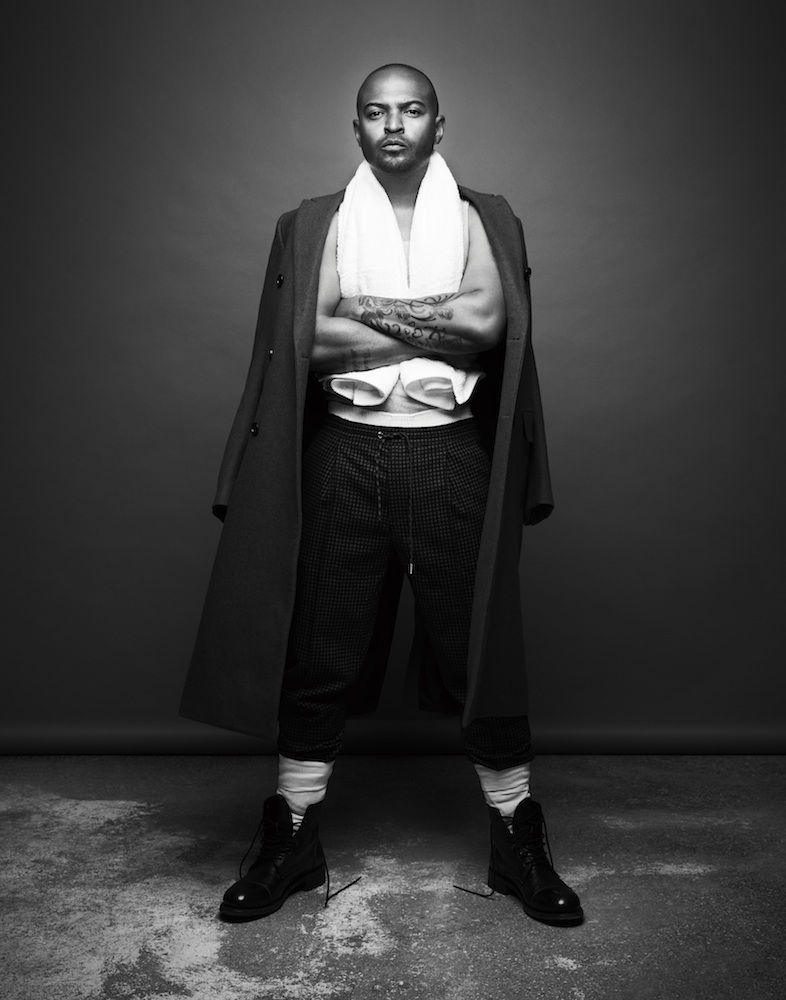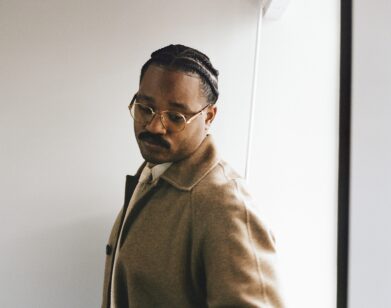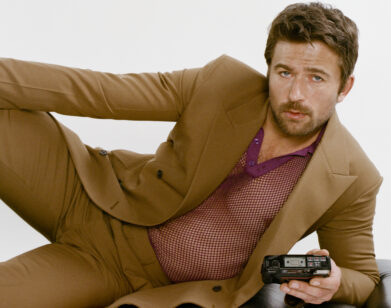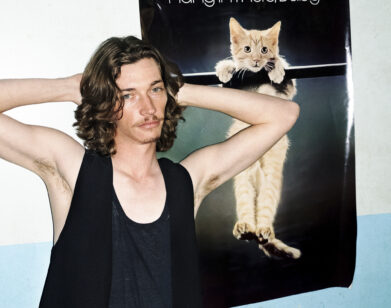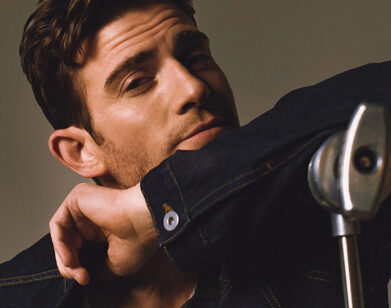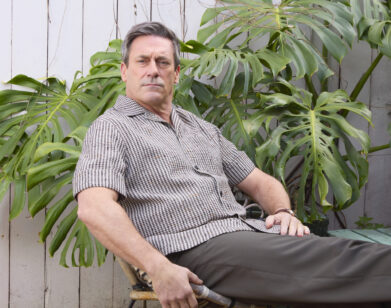Noel Clarke
NOEL CLARKE IN LONDON, SEPTEMBER 2016. PHOTOS: MATT HOLYOAK/KAYTE ELLIS AGENCY. STYLING: NIC JOTTKANDT. GROOMING: LIZ DAXAUER FOR TOM FORD GROOMING/CAREN. PHOTO ASSISTANT: LUKE WELLER. RETOUCHING: THE SHOEMAKER’S ELVES LONDON.
In the U.S., Noel Clarke is best known as an actor in blockbusters like Centurion and Star Trek: Into Darkness. In the U.K., however, the 41-year-old is a one-man production machine: an actor-turned-actor-writer-director-producer. With his Kidulthood-Adulthood-Brotherhood trilogy, which follows a troubled man named Sam (Clarke)—a villainous secondary character in the first film—as he struggles to make something of himself after a misspent youth, he has immortalized his West London neighborhood and spawned an entire subgenre of imitators. The other films Clarke has written are diverse in terms of genre: a romantic comedy, an all-female heist movie, a supernatural thriller.
When we first meet Clarke, it is at the Toronto Film Festival in September, where Brotherhood is screening. Though they are not alike in temperament, Clarke sees Brotherhood‘s Sam as an exploration of a road not taken—where his life might have led him under different circumstances. These alternate realities are something he thinks about frequently as a writer. “My family is Canadian—my aunt came here in 1969. My grandmother’s here. I’ve got 12 cousins. I’m staying at my aunt’s right now,” he says. “I could’ve grown up here, and then I probably wouldn’t have made the films that I’ve made because I’d have had a different experience. I’d be with a different person; my kids would be different. I love the thought of the Sliding Doors, as it were,” he continues. “If my mum had never left Trinidad and I’d grown up in Trinidad, it would be different.”
Just before Christmas, Clarke talks to his friend Brian Cox over the phone, and we listen in.
BRIAN COX: You’ve had a very great career. I think it’s a great advert for what is possible. Your journey is very similar to mine, funnily enough, from the theater to cinema. Where did you grow up?
NOEL CLARKE: I grew up in West London, in Ladbroke Grove. It’s in North Kensington, which sounds really glamorous now, but at the time it wasn’t very glamorous. In the ’60s and late ’50s, it was a place where they shoved a lot of the black people that were coming over. My dad left, but that’s where my mum raised me, which is why Kidulthood—all of them—are set in that area.
COX: Funnily enough, when I was a student in the ’60s, I lived in Cambridge Gardens for about two months, so I knew Ladbroke Grove quite well, particularly in the ’60s when it was very, very rough. Where did the creative thing come from?
CLARKE: I have no real idea where it came from, other than two key factors: My dad, who wasn’t around, was a very creative carpenter. I don’t know if I just got some of that creativity, but I think that coupled with the drive that I had because my mother was a single mother. I was going to school on my own from seven years old; I had my own key. I’d come home and be put in front of the television while she had to go out and work: “This is your snack at this time, this is your snack at this time. Don’t let any strangers in the house.” I’d just watch television and films and grew to love it.
COX: Is that when you decided you wanted to be an actor?
CLARKE: Yes, at a very, very young age—6 or 7. I knew what I wanted to do before I even understood what it was. I find that really unbelievable. I have an 8-year-old myself, my oldest son, and I couldn’t imagine him knowing what he wanted to do, but I feel like I knew at that age.
COX: I’m exactly the same. I’ve known what I wanted to do since I was 2. [laughs] I had a seminal background in the sense that my father died when I was quite young and my mother was institutionalized for a while, so I spent all my time at the cinema. I suppose you were a kind of latchkey kid.
CLARKE: Yes, exactly. It was a different time. I was going to school on my own at 7; it was a mile away. I’d walk on my own, come back on my own. On the weekends, when you went out to play, you could just play, and it was only at 8 P.M. that you would hear your mum’s voice: “Noel!” Or someone would say, “Your mum’s calling you,” and you’d run back home. I can’t imagine letting my kid out till eight o’clock on his own. I wouldn’t do it. But it was a more innocent time, where there was a better sense of community because there were less distractions. “Latchkey kid” is the exact term.
COX: When did the writing start?
CLARKE: In my early teens. In my early teens, I started watching a lot of the American stuff that was coming out—Boyz n the Hood and those types of films—and wondering why we didn’t have anything like that here, why everything I saw, the people of color were just dancing or stealing. So I started writing. I got frustrated without even understanding it. I was starting to write stuff that I wish I was doing. Like I saw Star Wars and there wasn’t anyone cool apart from Lando—we weren’t Luke or Han. I would watch other films and we weren’t one of the Goonies, so I would kind of pretend to write my own little stories where I was one of the Goonies or I was the main guy. I think it stemmed from there, really.
COX: What was your schooling like? Are you grateful for your schooling or was it a waste of time?
CLARKE: Schooling was regular state primary school and secondary school. My mum could never help me with homework because she couldn’t understand it, so I just got by. I don’t even know how I got by. I help my kids with the homework now, and some of it I find pretty tough myself if I’m honest. I was a liked kid, but I didn’t excel in anything except sports. People thought I might be a footballer. I was just that middle kid—I could get on with all the nerdy kids, but if there were bullies, they wouldn’t bully me because I would never have it. My GCSEs were just average—I passed, like, two GCSEs in school and they were with Bs. I realized later on that was because I learn in a different way and the curriculum can’t and won’t adjust for that.
COX: Did you have any influential teachers—people who stuck up for you?
CLARKE: Yes, but that came later. It wasn’t until I got to sixth form college, where we stopped talking about things and having textbooks and actually had an edit suite and had cameras and had things that you could physically touch. From 16 to 19, a teacher called Mr. Jones was showing me films like Pulp Fiction and Y Tu Mamá También, and that’s really where my mind was unlocked.
COX: It’s funny that we always have one or two people who just help us along the way, who just nudge us to the next stage. And we’re always grateful to them. I had the same thing with a couple of teachers, because my education was a complete disaster. Did you go to drama school?
CLARKE: No, there was no drama school. A-level Theater Studies is the extent of my training in that regard, and that was at my college with a great teacher called Mr. O’Connell. Those two teachers, Mr. O’Connell and Mr. Jones, I guess they saw something in me. Mr. Jones would come in on a weekend because we wanted to make music videos; they just saw something and that childhood thing of wanting to be an actor and make films was sparked again by them. I don’t think they were even like, “He’s special,” I just think they were young. I remember Mr. Jones being just out of university—he was 24—so he had a passion that maybe an older, jaded teacher may not have had. They just pushed me in that direction.
COX: How did you start professionally?
CLARKE: From A-Level Theater Studies, I just kept trying to find any sort of drama group I could. Because I excelled in sport, I was a qualified personal fitness instructor and lifeguard. At age 15, when all my other friends were lazing about, I got a job at the local sports center, being at first a waterslide attendant. [laughs] In that sports center if you wanted to progress, they would help you: if you wanted to do your lifeguarding course, they would pay for half of it and you would pay for the other. To me, that was a no-brainer. I qualified as a lifeguard. I realized about a year later that worked for gym instructors, so I became a gym instructor. Being in this sports center in what was going from Ladbroke Grove to North Kensington, there were people that would come in—gyms weren’t a big thing at the time—like Paula Yates, Sinead O’Connor, Ruby Wax. There was opportunity to talk to people. I met a director in there who was doing a TV show. I think I was about 21, and he needed a character much like myself, but 16. I said to him, “I did A-Level Theater Studies. You see me in the gym; I work hard. Can you get me an audition?” And he said, “You’re not a trained actor, but I will get you an audition if you promise not to embarrass me and know your lines and look 16, and you don’t look 16.” I said, “I will look 16 and I will know my lines if you get me an audition.” That was Rikki Beadle Blair, who I still talk to today. He got me the audition and I knew that script back-to-front. Over all the trained actors, I managed to get that job and that was the start—the pilot of a six-part series called Metrosexuality.
COX: Do you see yourself as an actor, a writer, a writer-actor, or an actor-writer? Or do you not even think about it?
CLARKE: I don’t even think about it. I just do the stuff that comes up. I direct as well. All of this has come out of necessity. I only ever wanted to be an actor. The writing came from not getting the roles I thought I could get or that I deserved. It was the same thing as when I was a kid and I was fantasizing in my notebook. Some people would say it’s arrogant; I remember my agent saying, “You’re a council estate kid, any job you get you should be grateful for.” And I was, but I was like, “I’m not just going to play Thief #3.” So I started writing. Then, after I wrote Kidulthood, the director didn’t want to do the second film. The studio said, “If he doesn’t do it, there’s not movie,” so directing came from necessity. As a producer, I was robbed blind. I put my name as a producer on the next film, and the real producers, who knew what they were doing, robbed me blind. I’ve never been paid to this day. So I had to learn how to produce. Everything came from the necessity of not wanting to have people take advantage of me. That’s how it all snowballed into me being who I am today.
COX: Self-sufficient, which is good. When you made Kidulthood and then Adulthood, did you think you were going to come back to that world of Sam? Did you envision it might be a trilogy?
CLARKE: When we did Kidulthood in 2006, which I had only written, that was it. There were never any plans. But I had all these other scripts written that I tried to get around to people and nobody was interested. Nobody was interested in me being a young black man writing about four women; nobody was interested in me writing a middle class rom-com. Eventually I found myself with a young baby and no money, so I thought, “If they want me to do that, maybe I’ll do that again, but do it better.”
COX: You really are a true example of necessity being the mother of invention. Everything has spun from necessity, and the creative urge has taken over and become something else, which is quite unusual really. Not a lot of people have the chutzpah to go through it.
CLARKE: It’s always been necessity and then the willingness to take the risk. I always feel, even to this day, that people don’t expect me to do things. They don’t expect me to go that extra mile, to say, “Fine, I’ll direct Adulthood;” to, when I got robbed, become a creditor and deal with it and battle on. I’m always willing to work that little bit harder to achieve what I need to achieve because I feel like it’s a blessing for me to be here. I was never supposed to be here. I’m the black council estate kid, single parent, from West London, with friends that are in jail, friends that have committed heinous crimes, friends that are doing nothing. I’m not supposed to be here, therefore I have nothing to lose. I’m always going to work harder than everyone else because if it doesn’t work, “So what?”
COX: Do you see the character of Sam as a sort of the image of what you might have been?
CLARKE: One hundred percent. Yes. At the wrap party of Brotherhood, the latest one, we had the head of Lionsgate there. To his left was my friend who’s a banker, who’s now a good friend because of where my life has taken me; to his right was my good friend who was bad when he was young, got sentenced to 25 years, served 12, and is now out and living a good life. But this is the point: I could’ve been there. I think one thing my mother always instilled in me was a sense of individuality. Being an only child, I never thought I had to rely on anyone. I was never afraid to be alone and I was never afraid to be my own person. So when all my friends were like, “Let’s smoke weed,” I was like, “I’m not doing it.” It wasn’t because I was trying to be a rebel or because I didn’t like it or I was anti-drugs. I just didn’t do it because I didn’t want to do it, and if I didn’t want to do it, I wasn’t doing it. That was it.
COX: When you start a script, are you looking for inspiration or do you wait for an idea to come? What inspires you to tell a story?
CLARKE: Everything and anything inspires me. About a year and a half ago, I saw a deaf girl on the tube—one of the most beautiful girls I ever saw. I was probably staring and I shouldn’t have been. Then she pulled her hair back and she had a hearing aid. She did the other side and she had two hearing aids. I was even more enamored. I thought of a whole rom-com about a guy that falls in love with a deaf girl and how he would woo her.
COX: You’ve been quoted as saying that when you watch the films you’ve directed, you can see how you’ve evolved technically as a filmmaker. Do you feel the same way about your acting?
CLARKE: Yes. Because of the lack of training in all three disciplines, it’s taken me a while to really hone it down. As a man—no longer a teenager that can play those really young roles, but as a man—I think I’ve only just got good in the last three or four years. I only watch [my old films] because, as someone who wasn’t trained, that’s how I look at my mistakes; I see something and I go, “Well, that’s not good,” and I learn from my mistakes. Same with the writing and same with the directing. Technically, Adulthood, as great a film as it is, directing-wise, it’s a mess. 4.3.2.1 is better. Then The Anomaly, which I did not write, technically is a lot better than the other two. All of those things came to a head with Brotherhood, which has just been phenomenally successful and done really well for us.
COX: The work you’ve done in the theater, for example, have you met some good people along the way—people you’ve learnt from?
CLARKE: Yes. Richard Wilson was very influential for me [as a theater director]. He always talked about my stillness on stage, and how that would translate well to screen if I could learn to curtail my energy a little bit. He would do this hand motion, open his hand and then close it and say, “Just bring it down. Bring it down.” If I do a take and I think, “Well, that was a bit clownish,” I always picture Richard Wilson doing the fist.
COX: He’s a good man, Richard. He’s a considerable person. Have you ever had to fight for a role as an actor?
CLARKE: I’m about to!
COX: [laughs] You’re about to go into battle are you?
CLARKE: There’s a book that I tried to option a couple of years ago about the Caribbean experience in London in the ’50s in Ladbroke Grove. It’s a book I’ve known about since I was young; it’s basically the life that my mum and dad lived. I recently heard that the BBC and the BFI are getting behind this movie. I contacted the director, who I’ve known for a while, probably over 15 years, and we met only last week. He said, “I definitely want you in this film. I want you to read the script and choose your part, but I wrote the lead part for X.” I said, “Well X is not playing the lead part. I’m playing the lead part—”
COX: [laughs]
CLARKE: “You know as well as I did I grew up in this area. You know that I’m from the island that the main character is from—my parents are from the island. And with all due respect to X, he’s a person I know and I admire, that’s not him. That’s me and that’s my film and I want to play this role.” He said, “I hear you.” I said, “I don’t want you to hear me, I want you to really understand and go away and think about it.” By the end of the conversation, he was like, “I will actually think about it.” He emailed me and I emailed back and I signed off with the character’s name. I’m going to go to battle for this role. [Through] my Caribbean experience, my dad’s Caribbean experience, me growing up as a child of that generation, I feel like this film is my film and I should be playing that role.
COX: Good on you. Now, what is it that frustrates you most about our industry?
CLARKE: The thing that frustrates me most, I think, is the class divide, and the way that people from a certain class can be treated. I wouldn’t even go into the race thing, because that is what it is. It’s not necessarily acceptable, but I think what people forget is, you can transcend that if you are from a certain class; if you’re from a working or lower class, it’s almost a double battle. For example, Brotherhood came out in 2016. Not only was it critically well-received, but it actually was a box office smash. The only British independent films ahead of Brotherhood in terms of box office were Eddie the Eagle, Eye in the Sky with Helen Mirren, and The Danish Girl. We even beat the Ricky Gervais movie. We beat Ken Loach’s movie—I love Ken Loach. We are the very definition of British and independent, yet we get absolutely ignored at the British Independent Film Awards. That is not about anything other than class. Our film is not worthy because it’s by lower class people about lower class people.
COX: Do you think Shane Meadows would agree with you on that one? [laughs] You’re not going to get any argument from me on that. I think you’re probably right. How do you feel about diversity in the cinema? This big question of diversity?
CLARKE: I feel like it’s getting better. Things are changing. The BFI recently did a study of the [British] films that have the most people of color in them in the last 10 years, and in the top 10, three of the films were my films. I’ve always been a glass-is-half-full person. I’ve always gone, “If people aren’t going to do it, I’m going to do it.” To see that top 10 list, it made me proud. Things are changing and I’m part of that change; whether I reap the benefits or the people after me reap the benefits, we’ll see, but I’m glad to be part of it. I’m proud to be part of it. I’m never going to sit here and moan about diversity because I know I’m one of the people that’s changing it and I’m going to continue to do that.
BROTHERHOOD HAD ITS NORTH AMERICAN PREMIERE AT THE TORONTO INTERNATIONAL FILM FESTIVAL LAST SEPTEMBER. CLARKE CAN NEXT BE SEEN IN THE FILMS MUTE AND I KILL GIANTS, BOTH OUT LATER THIS YEAR. BRIAN COX IS A BAFTA- AND GOLDEN GLOBE-NOMINATED ACTOR. HE WILL PLAY MARLON BRANDO IN ELIZABETH, MICHAEL AND MARLON AND WINSTON CHURCHILL IN CHURCHILL.

